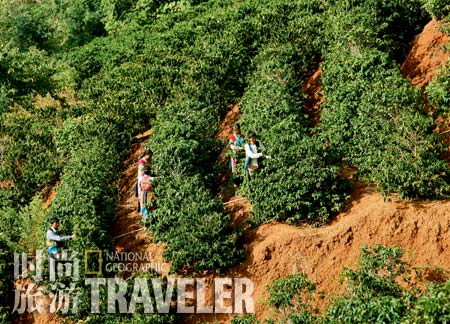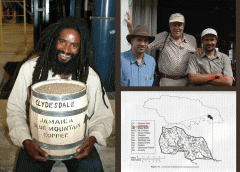Masaki Tashiro: Memories of working on an organic coffee farm

The Memory of Life--Masaki Tashiro
Under the shade of the kapok tree in the courtyard, a table covered with Yunnan batik blue tablecloth was placed with brewing and drinking coffee utensils. The workers in the coffee estate sit here during afternoon naps and drink fresh coffee produced in the past year. The aroma wafts in the sun. Masaki Tashiro told me that Panzhihua will bloom in February, when the aroma of flowers and the beautiful taste of coffee blend together to make people intoxicated.
The road to the coffee farm is 6 kilometers, and Zhengshu travels to the farm once or twice a day, where he is responsible for checking the quality of the coffee beans picked and the growth of the coffee trees. Coffee beans are picked between September and February, the busiest time for coffee farms. Because it is organic cultivation, coffee trees must ensure healthy growth, pests or diseases must be treated and cleaned in time, and pesticides are not allowed to be used in the process, so a lot of work needs to be added to ensure that coffee trees are not plagued by pests and diseases.
A dozen farmers now work on the farm, some of them living in small houses on the hillside, most of them Miao and Dai. Farmers here maintain traditional customs of life, they wear embroidered with beautiful patterns of national clothing to pick coffee, in a row of green coffee trees between the ridge is very easy to identify, like a blossoming flowers in the bush. They drink a fragrant tea called orange grass growing under coffee trees. This plant has a natural citrus fragrance. People living on both sides of Gaoligong Mountain have the custom of drinking this kind of grass tea, which cannot be seen in the market. Zhengshu also liked this grass tea very much. He would sit in the small courtyard with the farmers in the rest room and drink it. He said the plant's roots, which dig several meters underground, bring a special ingredient to the soil that is also the best vaccine for young coffee trees against disease.
Farmers on the farm also raise chickens and pigs here. Tian Daihe likes to see pigs most. Every time he goes to the farm, he will argue to visit the pigs 'home. Poultry and livestock manure is not directly used for fertilizer, but is collected and processed as a small part of the Tashiro couple's coffee tree diet, which also includes EM bacteria, coffee shells, coffee bran, oil cake (residue from vegetable oil extraction), charcoal residue, etc. January and February are the best days to produce food for the coffee trees of the year. Tashiro Si is the commander-in-chief of coffee food production. When her husband makes fertilizer, she draws the whole production process into a cartoon diagram to explain to me, and the boring biological knowledge suddenly becomes vivid and easy to understand. Masaki Tashiro said that this technology can be used not only in coffee cultivation, but also in this way to enable local people to learn more techniques to promote organic cultivation of crops.
Every day farmers bring baskets of red fruit back to the courtyard. Tian Daihe likes to run among the fields of coffee trees of her age. The saplings are the same height as her. Tian Daiji told her that every small tree here is a child like you. Cherish your friends. Harvest season joy and busy interwoven together, beautiful days interwoven in the aroma of coffee.
Important Notice :
前街咖啡 FrontStreet Coffee has moved to new addredd:
FrontStreet Coffee Address: 315,Donghua East Road,GuangZhou
Tel:020 38364473
- Prev

Blue Mountain Coffee Manor: Conastale Manor (CLYDESDALE)
Located in the middle of the Blue Mountain area, Conastale Manor, known as the heart of the Blue Mountains, is the highest Blue Mountain Coffee Bean Manor, adjacent to the largest national park and forest reserve in Jamaica. Coffee beans have been exported since the 1800s, and the selected fields, sun farms and water wheels of 200 years ago are still preserved today. Aroma,body, excellent balance of acid, mild taste, leaving a touch of sweet pulp
- Next

Visit Columbia Coffee Manor Coffee Bean Manor
The basic data area of the Republic of Colombia is three times the size of the capital of Japan, Bogota, Spanish, Spanish, per capita GDP48 ten thousand yen Japan is 4.2 million yen above sea level Bogota is 2600m above sea level the land of Colombia has a mountain area. As an equatorial country, coffee is produced in mountains at higher elevations. It's a long journey from Japan to the capital Bogota! It's 26 above sea level.
Related
- Does Rose Summer choose Blue, Green or Red? Detailed explanation of Rose Summer Coffee plots and Classification in Panamanian Jade Manor
- What is the difference between the origin, producing area, processing plant, cooperative and manor of coffee beans?
- How fine does the espresso powder fit? how to grind the espresso?
- Sca coffee roasting degree color card coffee roasting degree 8 roasting color values what do you mean?
- The practice of lattes: how to make lattes at home
- Introduction to Indonesian Fine Coffee beans-- Java Coffee producing area of Indonesian Arabica Coffee
- How much will the flavor of light and medium roasted rose summer be expressed? What baking level is rose summer suitable for?
- Introduction to the characteristics of washing, sun-drying or wet-planing coffee commonly used in Mantenin, Indonesia
- Price characteristics of Arabica Coffee Bean Starbucks introduction to Manning Coffee Bean Taste producing area Variety Manor
- What is the authentic Yega flavor? What are the flavor characteristics of the really excellent Yejasuffi coffee beans?

